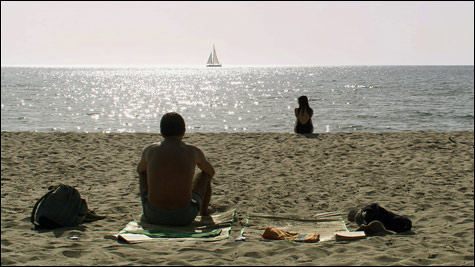
AMBIANCE: You might think Climates is about emptiness, but the soundtrack insists that the world is full. |
In Climates, the time is out of joint, and something is wrong in the way vision breaks down the world and puts it back together, even though what the film shows seems to be all simple and immediately understandable things. University professor Isa (played by the film’s director, Nuri Bilge Ceylan) is on holiday with his girlfriend, Bahar, a TV art director (Ebru Ceylan, the director’s real-life wife), and tensions that have probably long been present between them come to the surface in strange, unpredictable ways. (She breaks out laughing for no apparent reason during a dinner with friends; on a beach with him, she dozes off and has a dream in which he buries her face in sand.) They break up. Months later, in Istanbul, Isa learns that Bahar is working on a shoot in eastern Turkey, and he decides to follow her there and try to win her back.The visual patterns of Climates reflect the way each of the two’s needs and expectations fail to meet those of the other, as the film switches back and forth between the (implied) viewpoints of Isa and Bahar. A regular motif finds one or the other in close-up against a distant and out-of-focus background — a kind of image that pushes the isolation of consciousness in the world to an extreme. Ceylan’s film is about radical solitude and its pain. Yet it’s also about solitude as an illusion: in scene after scene, two consciousnesses are juxtaposed, and the solitude of one is only the momentary obliteration of the other. Because of the freedom with which he articulates the characters’ viewpoints, Ceylan’s cutting carries a specific uncertainty: each cut might mean merely a continuation from one moment to the next, but it’s at least as likely to mean a disruption, as in the scene that shows Bahar’s dream.
Ceylan tempers the abruptness and the firmness of his cutting with, on the one hand, the same intensity of response to scenic beauty that marked his three previous features (1997’s Kasaba, 1999’s Clouds of May, 2002’s Distant) and, on the other, a fluid, lush sound design that implies and demands a response of equal intensity. From time to time distant thunder rumbles, or dogs bark; wind and water, usually placed far back in the soundscape, are aural presences every bit as real as the photographic presences on screen. Ambient sound is so alive in Climates that even when the narrative sparseness, a line of dialogue, or a shot of the hero alone in a snowy street might prompt the lazy viewer to conclude, “It’s about emptiness,” the soundtrack insists that the world is full.
Climates is a superb film of moods, and one of its great triumphs is the way mood changes are reflected in Ebru Ceylan’s face. In the first scene, Bahar sits on a hill overlooking a ruined temple that Isa is photographing, and her face gradually becomes troubled — a process that happens all on the inside, with only the barest difference in her outward expression from one instant to another. Near the end of the film she tells him another dream, a happy one; then her mood darkens as she registers his inability to share her happiness. There are few performances like this in cinema, and few directors who have the penetration and the patience to film them.
CLIMATES | Written and directed by Nuri Bilge Ceylan | With Nuri Bilge Ceylan, Ebru Ceylan, and Nazan Kirilmis | A Zeitgeist films release | Turkish | 101 minutes | MFA: January 5, 6, 10, 11, 12, 13, 17